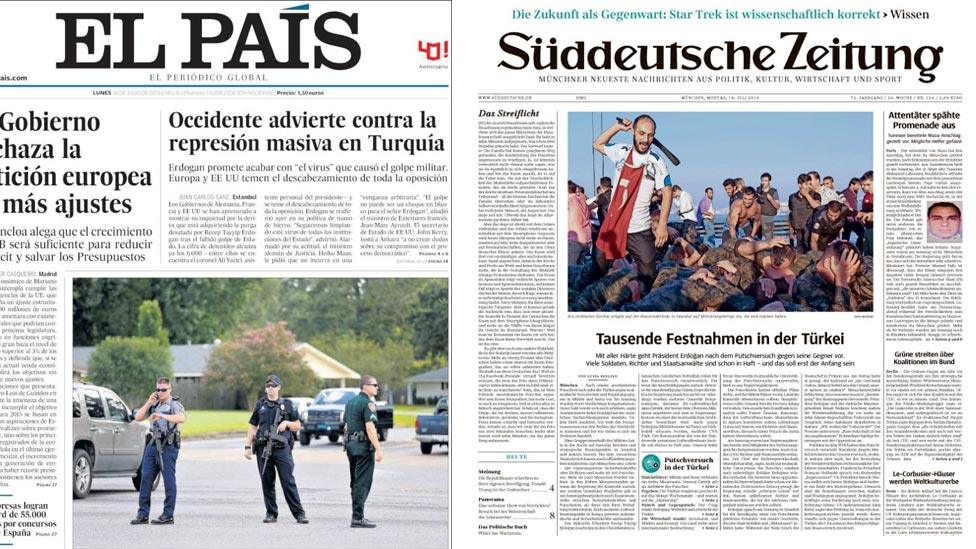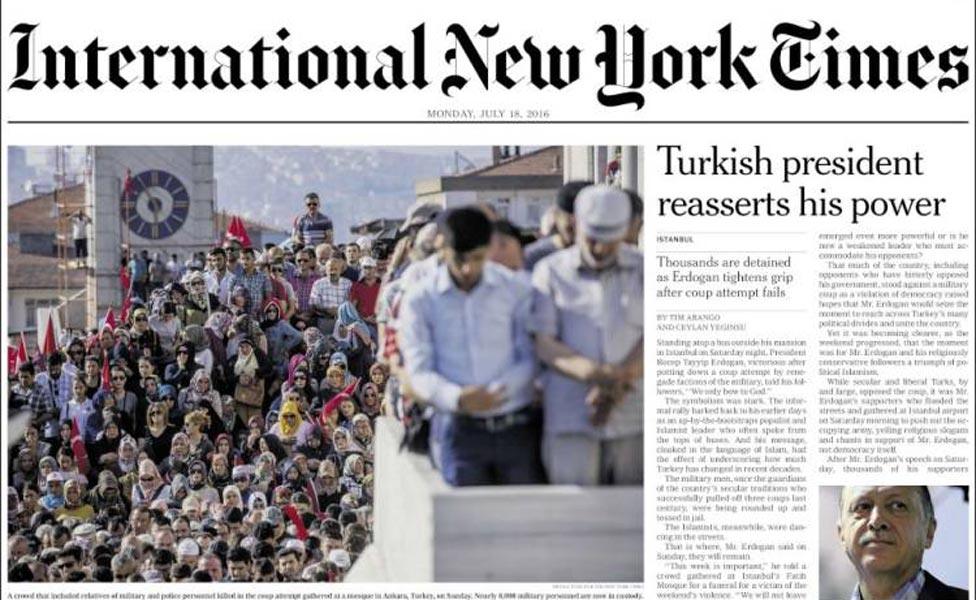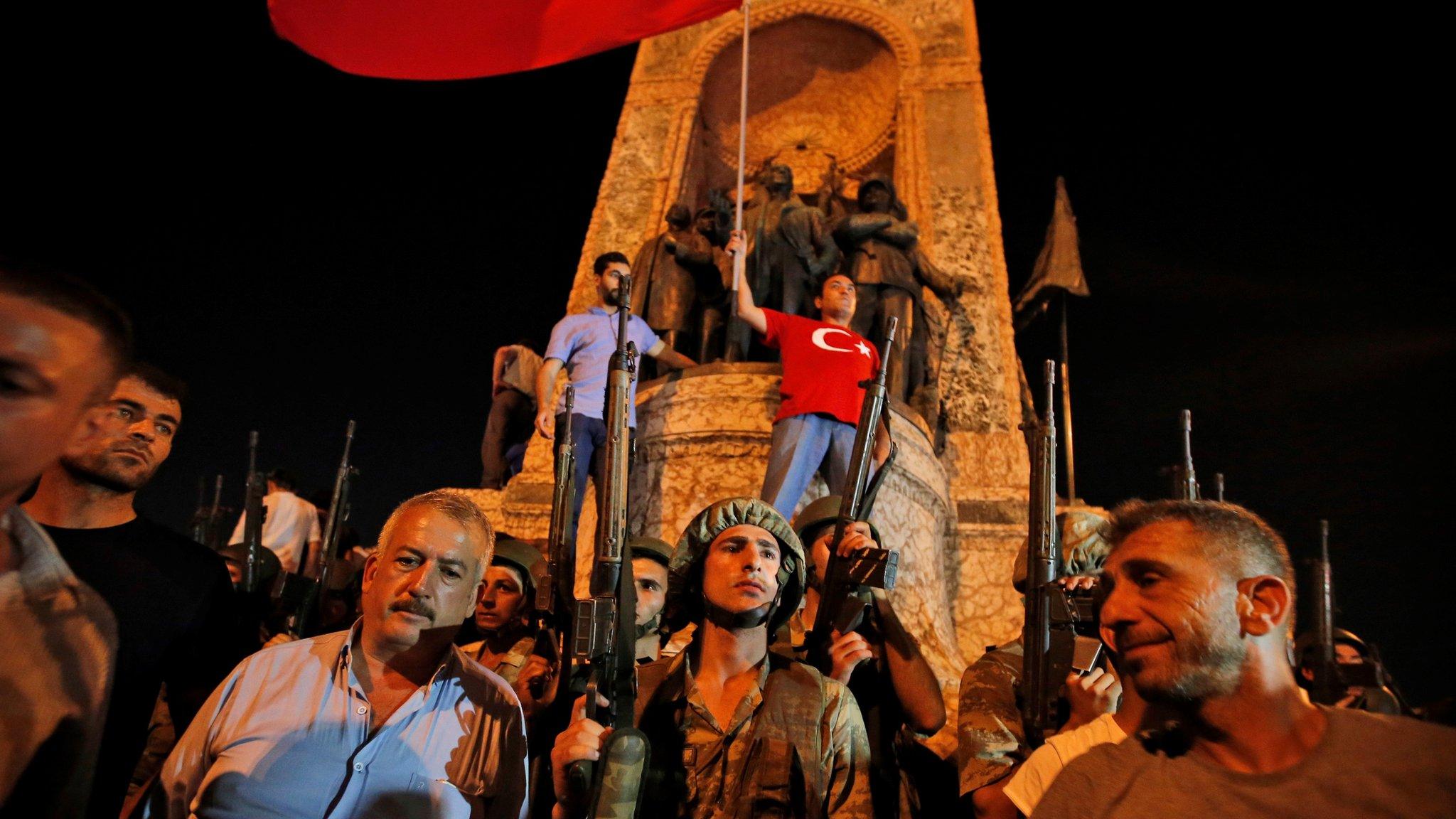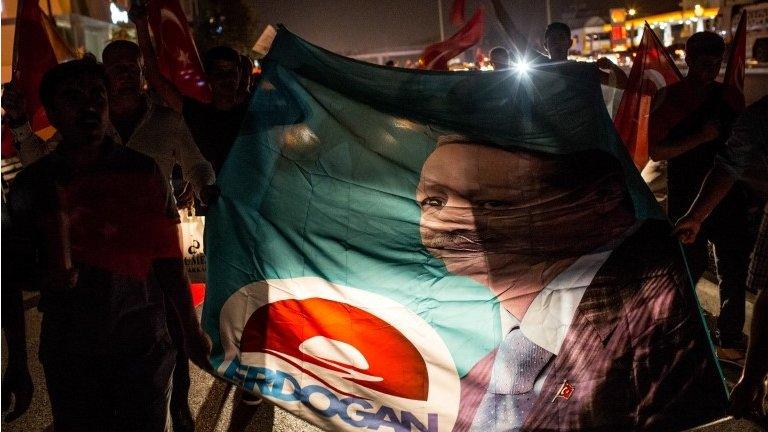Turkey coup: Press fears for democracy
- Published

Spain's El Pais highlights Western warnings against "massive repression" , while Germany's Sueddeutsche Zeitung reports "thousands of arrests"
Turkey's failed military coup has led some international media to fear President Recep Tayyip Erdogan will seize the chance to suppress all opposition.
While voicing relief at the failure of the "amateurish" coup, Germany's Frankfurter Allgemeine Zeitung, external (in German) predicts that the climate in Turkey will become "even more restrictive".
"The Turkish government is likely to infringe on democracy, freedom of opinion, and fundamental rights," it says.
In the UK's Guardian, external, a commentary bemoans "violent mobs sanctioned as 'protecting democracy' by the president".
Comparing the coup to an "unhappy wife being kidnapped by a misguided and incompetent lover", it predicts that the "wife will be 'safely' locked away and the lover disposed of - perhaps humanely, perhaps not".
Some go even further. Switzerland's Neue Zuercher Zeitung, external (in German) believes that -"tragically" - ordinary Turks' rejection of the military coup will result in the opposite of stronger democracy, and that instead Mr Erdogan will launch a "final sweeping blow" and a "witch hunt" against his opponents.
Across the Atlantic, an editorial in the New York Times, external also finds a sad irony in the fact that the very thing that saved Mr Erdogan - democracy - faces "accelerating erosion" by a president who is "becoming more vengeful and obsessed with control than ever".

The International New York Times leads on Mr Erdogan's taking control again
In German paper Die Welt , external (in German), Turkey correspondent Deniz Yucel even sees in current developments in Turkey "all the ingredients of totalitarian rule".
"After decades of putting on a show of being the victim - of the establishment, the military, terror groups - [Erdogan] has found his own victim: Turkish democracy."
'Lesser evil'

Germany's Tageszeitung compares Mr Erdogan's likely reaction to ordering a kebab "with hot sauce"
But several papers still have hope that Mr Erdogan might opt for moderation and reconciliation.
French news magazine Le Point, external (in French) urges Mr Erdogan to "restore his international reputation" and resist the temptation to "launch ugly repression".
Spain's El Pais, external (in Spanish) voices concern at Mr Erdogan's "authoritarian drift", and warns that he must ensure that democracy and the rule of law are further strengthened after the uprising's failure.
But the Netherlands' De Volkskrant, external (in Dutch) says that while Mr Erdogan is likely "to do away with his internal enemies", he is still the "lesser evil" and preferable to a "nonentity in uniform" who would risk destabilising Turkey and the wider region.
'Brave leader'
In contrast, the media's mood in Turkey is largely one of jubilation.
A commentary in Hurriyet, external (in Turkish) - which was raided by pro-coup troops - says democracy "would have been murdered" if the military uprising had succeeded, but warns that Turkey's future depends on "strengthening democracy and the constitutional state".
In Turkey, the pro-government newspaper Aksam, external (in Turkish) hails Mr Erdogan decision to call out the crowds to face down the "attack on democracy by vicious traitors".
"The honourable president's stance was of historic importance," says a commentary.

These Turkish headlines read "Danger on the streets" and "The coup split apart"
Another pro-government paper, Star, external (in Turkish), detects in Western media coverage - including that of the BBC - a desire for the coup to succeed, and believes this reflects the views of their people and governments.
"Who are we going to trust?" it wonders, but is confident in Turkey's success "as long as such upstanding and brave leaders as Erdogan are in office and this nation stands firm".
But there are dissenting voices.
The secularist opposition paper Cumhuriyet, external (in Turkish) says not "millions", but only "thousands", of people came to defend Mr Erdogan, and describes them as governing "AK Party militants with jihadist aspirations".
'Would-be sultan'
In Russia, with which Mr Erdogan only recently started to patch up a rupture in relations, several commentators accuse him of having brought the crisis upon himself.
In Moskovsky Komsomolets, external (in Russian), a commentary says the coup was a "direct result" of the president's "ambitions to be a sultan, his authoritarianism, his unpredictability, and attempts at destroying the secular foundations of the Turkish state".
In state-owned Rossiskaya Gazeta, external (in Russian), a commentary predicts that Mr Erdogan's new post-coup "regime" and his "bold authoritarianism" are likely to be "even more alien" to the values of the West, and Turkey will seek closer relations with countries such as Russia instead.
BBC Monitoring reports and analyses news from TV, radio, web and print media around the world. You can follow BBC Monitoring on Twitter, external and Facebook, external.
- Published18 July 2016

- Published16 July 2016

- Published16 July 2016
